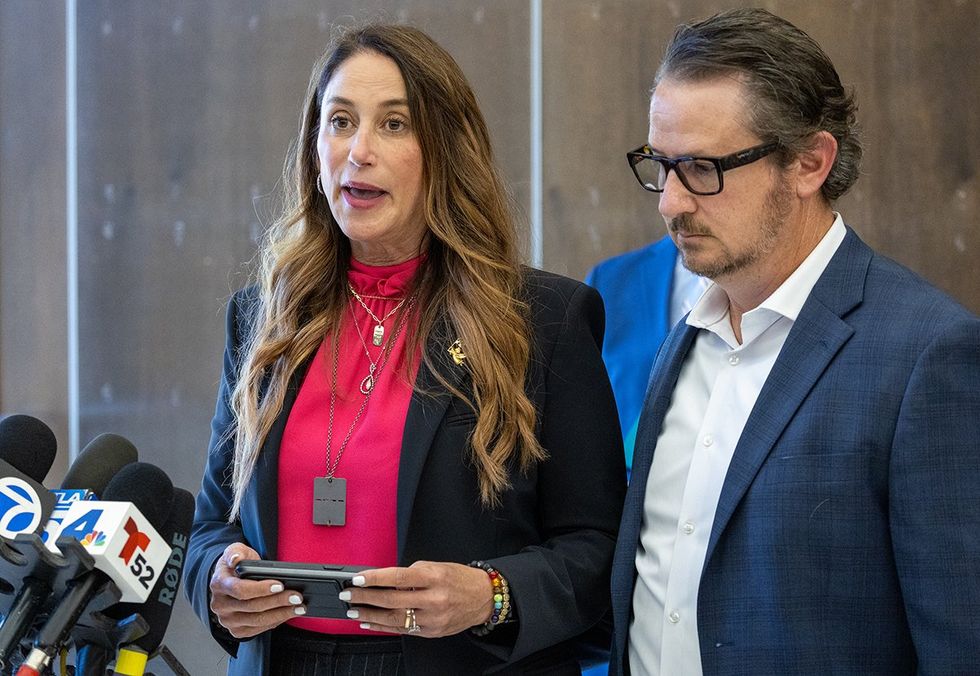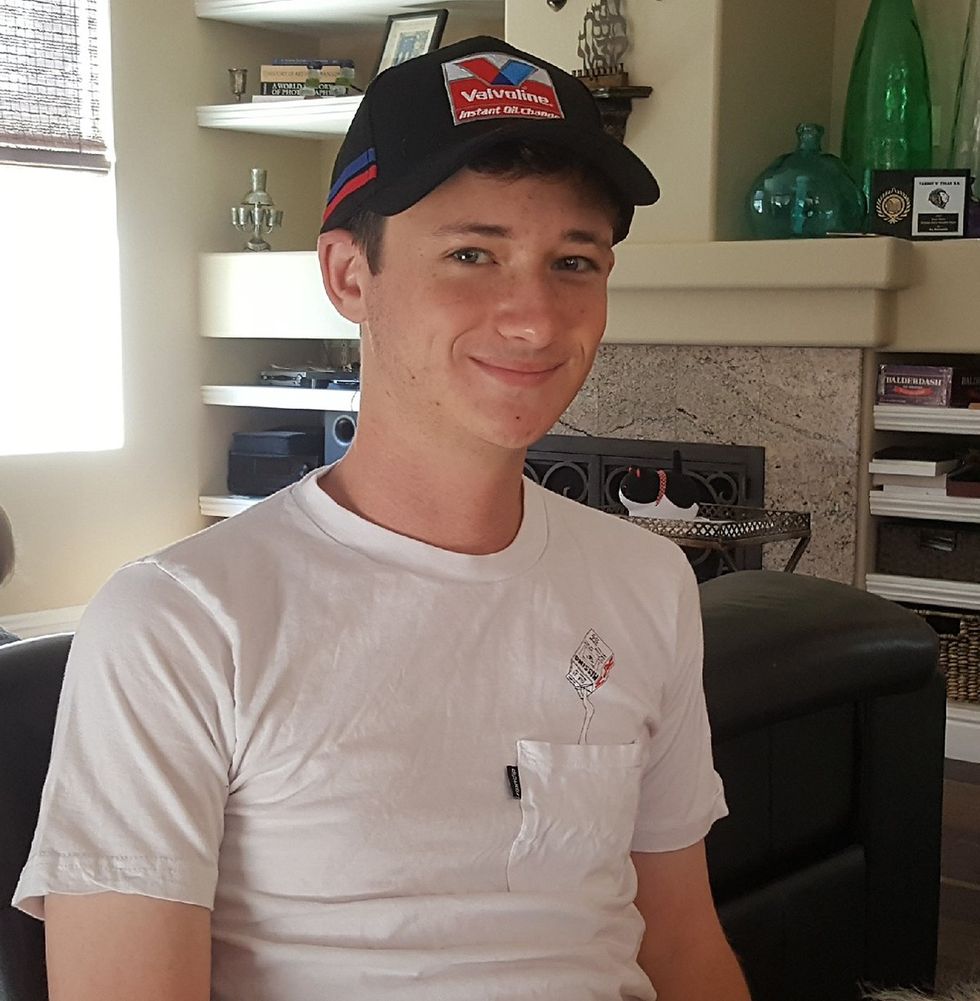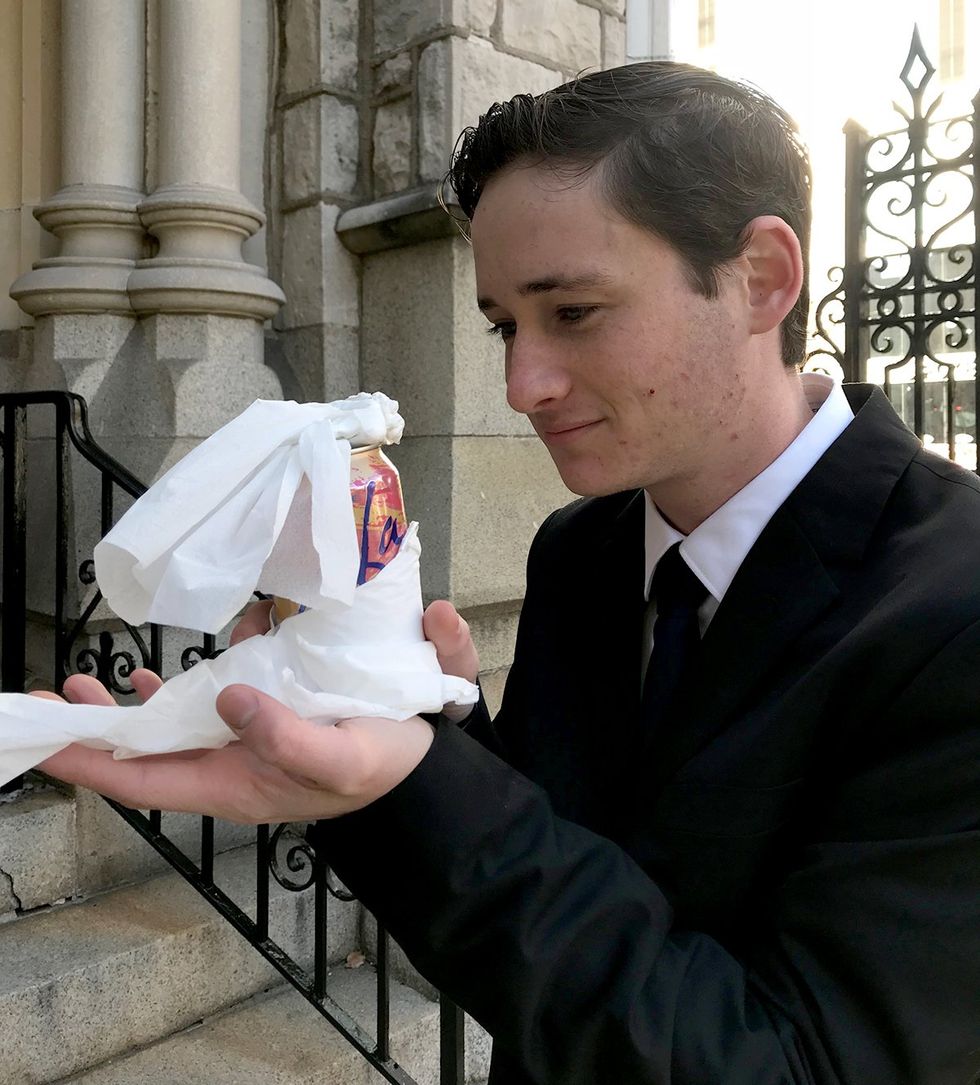Jeanne Pepper sits in quiet reflection just days after the sentencing of Samuel Woodward, her son Blaze Bernstein’s killer. For seven years, her family has been entangled in a legal process demanding their patience, strength, and silence. On Friday, a Southern California judge sentenced Woodward to life in prison without the possibility of parole, closing one chapter of the family’s long and painful journey.
Keep up with the latest in LGBTQ+ news and politics. Sign up for The Advocate's email newsletter.
“I think the biggest impact this long wait has had on our family was that we constantly had to weigh everything against how it might affect the trial,” Pepper tells The Advocate. “Even when I needed surgery, I had to ask, ‘How will this impact what’s happening six months or a year from now?’ Now, we’re no longer tethered to this person.”
 SANTA ANA CA, JULY 3, 2024 Gideon Bernstein, right, Blaze Bernstein's father, listens as his wife, Jeanne Pepper Bernstein, Blaze's mother, speak during a press conference after a guilty verdict was read, convicting Samuel Woodward of first-degree murder for the stabbing death of his former classmate, Blaze Bernstein, on Wednesday, July 3, 2024, at the Central Justice Center in Santa Ana.Allen J. Schaben/Los Angeles Times via Getty Images
SANTA ANA CA, JULY 3, 2024 Gideon Bernstein, right, Blaze Bernstein's father, listens as his wife, Jeanne Pepper Bernstein, Blaze's mother, speak during a press conference after a guilty verdict was read, convicting Samuel Woodward of first-degree murder for the stabbing death of his former classmate, Blaze Bernstein, on Wednesday, July 3, 2024, at the Central Justice Center in Santa Ana.Allen J. Schaben/Los Angeles Times via Getty Images
Still, she resists using the word “closure.” While justice isn't bringing Bernstein back, it allows Pepper to focus on moving forward and protecting others from the hate that took her son.
Related: Gay Jewish Student’s Alleged Neo-Nazi Murderer Faces Judge
The hate that took Blaze
Bernstein, a 19-year-old University of Pennsylvania student, was brutally murdered in January 2018. In a premeditated attack, Woodward stabbed him 28 times, leaving his body in a shallow grave in a Southern California park. Prosecutors said Bernstein was targeted for being gay and Jewish, a reality made even starker by Woodward’s affiliation with the neo-Nazi group Atomwaffen Division.
Woodward was found guilty of first-degree murder with a hate crime enhancement on July 3, following a nearly three-month trial. The jury concluded that Bernstein, a gay Jewish college student, was targeted because of his identity.
Related: Accused neo-Nazi describes killing gay Jewish college student Blaze Bernstein in disturbing testimony
For Pepper, Bernstein’s death feels emblematic of a broader cultural shift — one that she believes started with the rise of President-elect Donald Trump’s rhetoric during his first presidential campaign.
 Donald Trump poster at protestAlexandros Michailidis/Shutterstock
Donald Trump poster at protestAlexandros Michailidis/Shutterstock
“Blaze was so devastated when Trump won,” Pepper says. “He understood the significance in a way I didn’t yet. But as I watched things unfold, I saw it. The extremism, the blatant hate — it felt like his murder was part of this larger wave.”
Pepper recalls how the former president’s comments normalized hate, giving groups like the Proud Boys and other extremists public legitimacy. “Donald Trump told people there were ‘very fine people’ among the Proud Boys. What does that say to someone like [Woodward]? It says it’s okay to hate—it’s okay to act on that hate.”
Making Blaze’s legacy a call to action
Bernstein’s murder robbed the world of a young man who aspired to be a doctor and who loved writing, cooking, and connecting with people. Bernstein had the brilliance and compassion that Pepper believes could have changed the world.
“Who knows what Blaze could have accomplished?” she wonders aloud. “What if Stephen Hawking had been murdered at 18? Or Jonas Salk? That’s the kind of potential Blaze had.”
 Blaze BernsteinCourtesy Jeanne Pepper
Blaze BernsteinCourtesy Jeanne Pepper
To ensure Bernstein’s memory inspires others, Pepper and her family launched “Blaze It Forward,” a kindness campaign encouraging people to perform good deeds in his honor. Pepper also hosts a podcast, PeppTalks with Jeanne, where she spotlights people working to improve the world.
“I want to shift the narrative,” she says. “We spend too much time glorifying the perpetrators of these crimes. Let’s focus on the people doing good. Blaze was one of those people.”
A future worth fighting for
As the specter of a second Trump presidency looms, Pepper admits she worries about what it means for the LGBTQ+ and Jewish communities. She sees extremism thriving across the political spectrum and believes both sides [the far left and far right] bear responsibility for enabling it.
“We’ve allowed extremism to have a voice,” she says. “Until we decide as a society that hate is unacceptable, we’re going to keep repeating this cycle.”
 Blaze BernsteinCourtesy Jeanne Pepper
Blaze BernsteinCourtesy Jeanne Pepper
Despite the challenges ahead, Pepper remains hopeful. She speaks of a letter left in Bernstein’s memory by a juror from the trial. Initially reluctant to serve, the juror wrote about how the experience changed her life, inspiring her to approach her work with greater kindness and empathy.
“That letter reminded me that Blaze’s legacy is already making a difference,” Pepper says. “If we’ve changed even one person’s heart, it means Blaze’s life was meaningful.”
Choosing light over darkness
Pepper’s advocacy is driven by one memory: a conversation she had with Bernstein shortly before his death. She had asked him if he’d ever been in love. “He told me, ‘Don’t worry, Mom. I’ve been loved,’” she recalls. “That’s what keeps the darkness at bay: knowing how deeply Blaze was loved and how deeply he loved in return.”
 Blaze BernsteinCourtesy Jeanne Pepper
Blaze BernsteinCourtesy Jeanne Pepper
For Pepper, moving forward means continuing to fight for the world Blaze believed in — a world defined by kindness, equity, and love.
“Blaze believed in a better world,” she says. “I’m going to spend the rest of my life fighting for it. For him.”


 SANTA ANA CA, JULY 3, 2024 Gideon Bernstein, right, Blaze Bernstein's father, listens as his wife, Jeanne Pepper Bernstein, Blaze's mother, speak during a press conference after a guilty verdict was read, convicting Samuel Woodward of first-degree murder for the stabbing death of his former classmate, Blaze Bernstein, on Wednesday, July 3, 2024, at the Central Justice Center in Santa Ana.Allen J. Schaben/Los Angeles Times via Getty Images
SANTA ANA CA, JULY 3, 2024 Gideon Bernstein, right, Blaze Bernstein's father, listens as his wife, Jeanne Pepper Bernstein, Blaze's mother, speak during a press conference after a guilty verdict was read, convicting Samuel Woodward of first-degree murder for the stabbing death of his former classmate, Blaze Bernstein, on Wednesday, July 3, 2024, at the Central Justice Center in Santa Ana.Allen J. Schaben/Los Angeles Times via Getty Images Donald Trump poster at protestAlexandros Michailidis/Shutterstock
Donald Trump poster at protestAlexandros Michailidis/Shutterstock Blaze BernsteinCourtesy Jeanne Pepper
Blaze BernsteinCourtesy Jeanne Pepper Blaze BernsteinCourtesy Jeanne Pepper
Blaze BernsteinCourtesy Jeanne Pepper Blaze BernsteinCourtesy Jeanne Pepper
Blaze BernsteinCourtesy Jeanne Pepper


































































Charlie Kirk DID say stoning gay people was the 'perfect law' — and these other heinous quotes